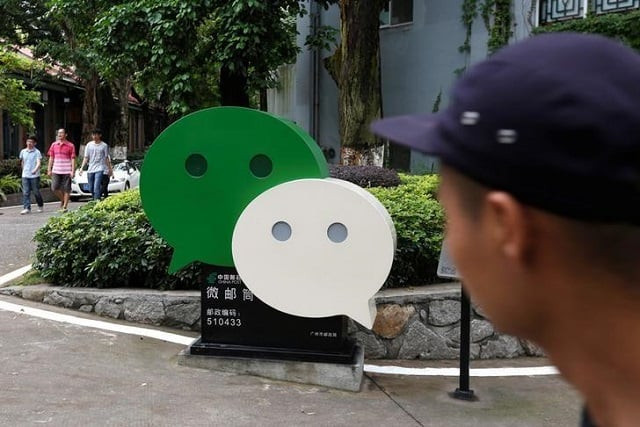China scours social media, erases thousands of accounts
China’s strict online censorship rules have tightened in recent years with new legislation

A WeChat logo is displayed inside TIT Creativity Industry Zone where Tencent office is located in Guangzhou, China May 9, 2017.
PHOTO: REUTERS
China’s strict online censorship rules have tightened in recent years with new legislation to restrict media outlets, surveillance measures for media sites and rolling campaigns to remove content deemed unacceptable.
The Cyberspace Administration of China (CAC) said in a statement that the campaign, launched on October 20, had erased the accounts for violations that included “spreading politically harmful information, maliciously falsifying (Chinese Communist) party history, slandering heroes and defaming the nation’s image.”
Facebook launches artificial intelligence video-calling device ‘Portal’
CAC also summoned social media giants, including Tencent’s Wechat and Sina-owned Weibo, warning them against failing to prevent “uncivilized growth” and “all kinds of chaos” among independent media on their platforms.
“The chaos among self-media accounts has seriously trampled on the dignity of the law and damaged the interests of the masses,” CAC said.
The term “self-media” is mostly used on Chinese social media to describe independent news accounts that produce original content but are not officially registered with the authorities.
Such accounts have proliferated in recent years and range from hard-hitting investigative journalism to celebrity gossip or lewd content. Many are hugely popular due to offering more novel and sensational news than official sources.
Online commentators noted that some of the accounts closed had been sharing false or pornographic content - both of which are illegal in China - but also lamented that some of the accounts targeted in this latest sweep appeared to have merely been too critical.
One Weibo user questioned why an art and entertainment blog called “youshuguang” was blocked.
WhatsApp launches Indian media blitz to dispel fake news woes
“The one I really don’t get is youshuguang, who made no sign of violations and wrote emotive content in a well-behaved manner. Why were they still blocked?” the Weibo user wrote.
“You get blocked if you write the truth, get blocked if you write lies, so what are we now supposed to say?”
NGOCN, a group that produced popular articles about social issues in China, also had two accounts deleted but pledged in a statement to continue producing content.
“This is an era of accounts being obliterated,” the group said. “It went from a single article being blocked, to the censorship of some prohibited speech... then today all of a sudden, we have no account.”


















COMMENTS
Comments are moderated and generally will be posted if they are on-topic and not abusive.
For more information, please see our Comments FAQ